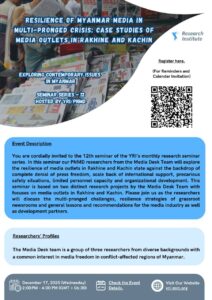Abstract
Transitional justice system is a crucial requirement in Myanmar’s post-conflict scenario, holding perpetrators of all levels accountable for their war crimes, crimes against humanity, genocidal acts and human rights violations to seek justice for victim communities. This study aims to provide relevant and most important recommendations for Myanmar’s transitional justice measures in post-conflict by learning from its close neighbors such as Cambodia and Nepal. Analyses are made from primary sources of government records, legal documents and reports from international organizations and also secondary ones such as scholarly academic articles to supplement primary analysis. The study discusses that Myanmar should be conscientious with developing transitional justice measures for all levels of perpetrators from the Tatmadaw to revolutionary forces and with defining amnesties and pardons for high-level perpetrators while establishing an independent truth and reconciliation commission, in order to ensure transitional justice for victims, through deliberating on transitional justice experiences of Cambodia and Nepal. These analyses suggest that implementing a comprehensive framework of transitional justice will ensure proper prosecution for perpetrators and justice and reparation for victims.
Keywords: transitional justice, perpetrator, victim, amnesties, Tatmadaw, Myanmar, Cambodia, Nepal

